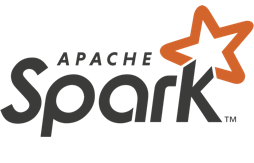Machine Learning Library (MLlib) Guide
MLlib is Spark’s machine learning (ML) library. Its goal is to make practical machine learning scalable and easy. At a high level, it provides tools such as:
- ML Algorithms: common learning algorithms such as classification, regression, clustering, and collaborative filtering
- Featurization: feature extraction, transformation, dimensionality reduction, and selection
- Pipelines: tools for constructing, evaluating, and tuning ML Pipelines
- Persistence: saving and load algorithms, models, and Pipelines
- Utilities: linear algebra, statistics, data handling, etc.
Announcement: DataFrame-based API is primary API
The MLlib RDD-based API is now in maintenance mode.
As of Spark 2.0, the RDD-based APIs in the spark.mllib package have entered maintenance mode.
The primary Machine Learning API for Spark is now the DataFrame-based API in the spark.ml package.
What are the implications?
- MLlib will still support the RDD-based API in
spark.mllibwith bug fixes. - MLlib will not add new features to the RDD-based API.
- In the Spark 2.x releases, MLlib will add features to the DataFrames-based API to reach feature parity with the RDD-based API.
- After reaching feature parity (roughly estimated for Spark 2.2), the RDD-based API will be deprecated.
- The RDD-based API is expected to be removed in Spark 3.0.
Why is MLlib switching to the DataFrame-based API?
- DataFrames provide a more user-friendly API than RDDs. The many benefits of DataFrames include Spark Datasources, SQL/DataFrame queries, Tungsten and Catalyst optimizations, and uniform APIs across languages.
- The DataFrame-based API for MLlib provides a uniform API across ML algorithms and across multiple languages.
- DataFrames facilitate practical ML Pipelines, particularly feature transformations. See the Pipelines guide for details.
What is “Spark ML”?
- “Spark ML” is not an official name but occasionally used to refer to the MLlib DataFrame-based API.
This is majorly due to the
org.apache.spark.mlScala package name used by the DataFrame-based API, and the “Spark ML Pipelines” term we used initially to emphasize the pipeline concept.
Is MLlib deprecated?
- No. MLlib includes both the RDD-based API and the DataFrame-based API. The RDD-based API is now in maintenance mode. But neither API is deprecated, nor MLlib as a whole.
Dependencies
MLlib uses the linear algebra package Breeze, which depends on netlib-java for optimised numerical processing. If native libraries1 are not available at runtime, you will see a warning message and a pure JVM implementation will be used instead.
Due to licensing issues with runtime proprietary binaries, we do not include netlib-java’s native
proxies by default.
To configure netlib-java / Breeze to use system optimised binaries, include
com.github.fommil.netlib:all:1.1.2 (or build Spark with -Pnetlib-lgpl) as a dependency of your
project and read the netlib-java documentation for your
platform’s additional installation instructions.
To use MLlib in Python, you will need NumPy version 1.4 or newer.
Migration guide
MLlib is under active development.
The APIs marked Experimental/DeveloperApi may change in future releases,
and the migration guide below will explain all changes between releases.
From 2.0 to 2.1
Breaking changes
Deprecated methods removed
setLabelColinfeature.ChiSqSelectorModelnumTreesinclassification.RandomForestClassificationModel(This now refers to the Param callednumTrees)numTreesinregression.RandomForestRegressionModel(This now refers to the Param callednumTrees)modelinregression.LinearRegressionSummaryvalidateParamsinPipelineStagevalidateParamsinEvaluator
Deprecations and changes of behavior
Deprecations
- SPARK-18592:
Deprecate all Param setter methods except for input/output column Params for
DecisionTreeClassificationModel,GBTClassificationModel,RandomForestClassificationModel,DecisionTreeRegressionModel,GBTRegressionModelandRandomForestRegressionModel
Changes of behavior
- SPARK-17870:
Fix a bug of
ChiSqSelectorwhich will likely change its result. NowChiSquareSelectoruse pValue rather than raw statistic to select a fixed number of top features. - SPARK-3261:
KMeansreturns potentially fewer than k cluster centers in cases where k distinct centroids aren’t available or aren’t selected. - SPARK-17389:
KMeansreduces the default number of steps from 5 to 2 for the k-means|| initialization mode.
Previous Spark versions
Earlier migration guides are archived on this page.
-
To learn more about the benefits and background of system optimised natives, you may wish to watch Sam Halliday’s ScalaX talk on High Performance Linear Algebra in Scala. ↩
